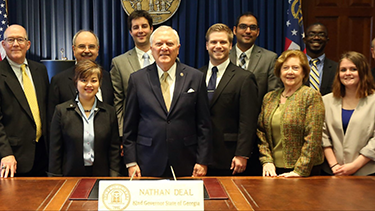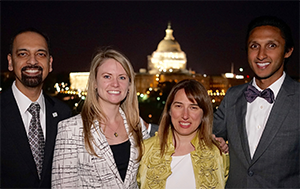Are you advocating for your patients? I’m guessing you are. If you aren’t, you should. In fact, you must. It’s what makes you a physician.
Think about the time and effort you have spent getting a patient with giant cell arteritis in to see a rheumatologist urgently or to get an urgent MRI for a third nerve palsy on Friday afternoon. For ophthalmologists, advocating for our patients never stops. We take call, while other eye providers don’t. As physicians, we have said to patients, “I am committed to do all I can to treat or save your vision and eyes.”
If you knew that there was impending danger or increasing risk to the eyes and vision of your patients or your community, wouldn’t you do something about it? You should. You must. That means being an advocate for the eyes and vision of your patients and community in every way possible.
Keeping our promise to patients takes advocacy on a macro level, too. The critical components include building relationships with legislators and contributing to funds that protect quality patient eye care. These include the Academy’s OPHTHPAC® fund and the Surgical Scope Fund.
Here are three ways young ophthalmologists can get involved and advocate on behalf of their patients:
1. Speaking out when laws threaten patient safety
Emory University ophthalmology resident Morgan Micheletti, MD, advocated for the patients of Georgia when legislators tried to pass a dangerous bill. “I made numerous phone calls to both senators and representatives regarding the [optometric] scope-expansion bill,” he said.

Emory and Augusta University residents join Georgia Society of Ophthalmology leaders at the Georgia State Capitol meeting with Gov. Nathan Deal (center). Morgan Micheletti, MD, pictured right of Gov. Deal.
“I spent several mornings at the Capitol, discussing the bill with legislators in person. We hosted a working legislative dinner with approximately 15 legislators to discuss this bill and its negative impact on patient safety. Additionally, I reached out to numerous news outlets and helped obtain an interview with NPR. I created a discussion in my local neighborhood and encouraged my community to contact our legislators as well. In Georgia, our efforts blocked two bills in the House, a third in the Senate. But after dirty politics, a fourth bill, SB 153, passed the legislature and awaits the governor’s signature. We are seeking a veto from Gov. Nathan Deal to ensure patient safety for Georgians.”
2. Building relationships with legislators
For Joseph Nezgoda, MD, MBA, who finished his retina fellowship at UCSD in 2015, advocacy outside clinic has become a habit. “Patient care was always my passion,” he said. “I began by going to my state ophthalmology society meetings and attending lobby efforts. It is surprising how much state and national legislators can learn from young physicians in personal encounters.”
3. Educating local and federal legislators

Deepak Mangla, MD (far right), joins fellow YO Laura Snyder, MD, and Illinois Society of Eye Physicians and Surgeons leaders Sohail Hasan, MD, PhD (far left), and Chris Albanis, MD (middle right), during his participation as an Advocacy Ambassador at the Academy’s Mid-Year Forum 2016.
Northwestern University resident Deepak Mangla, MD, advocates for the patients of Illinois in multiple ways. "We must not only be simply physicians; we must be able to wear the many hats of lobbyists, accountants and lawyers,” he said. “As the health care landscape changes, so will our practice patterns.”
At the local level, Dr. Mangla has lobbied in Springfield, Ill., and participated in a legislative task force of the Illinois Society of Eye Physicians and Surgeons. He advocated for patients at the federal level as a 2016 Advocacy Ambassador.
“Many [critical health care] decisions are left to individuals that lack the expertise to optimize patient outcomes,” he said. “We must be involved in the process, with all of our hats, to allow our profession to continue to maximize outcomes for our patients."
If these three young ophthalmologists can advocate for their patients, so can you. Advocacy starts the first day of your residency. It’s vitally important to your patients and the very essence of what it means to be a physician.
| Surgical Scope Fund |
OPHTHPAC® Fund |
State Eye PAC |
|
Contribute
|
Contribute
|
Varies by state; contact your state society |
| Fights optometric surgical initiatives at the state level that pose a threat to patient safety and quality of surgical care |
Supports candidates for U.S. Congress |
Supports candidates for state legislature |
| Lobbyists, media, public education, grassroots efforts |
Campaign contributions and political education |
Campaign contributions and political education |
| Contributions: Individual or corporate |
Contributions: Individual |
Contributions: Individual or corporate — check state PAC laws |
| Contributions are 100% confidential |
Contributions above $200 are on the public record |
Contributions are on the public record — check state PAC laws |
* * *
 About the author: Peter A. Karth, MD, MBA, is a vitreoretinal surgeon in Eugene, Oreg., and joined the Academy's YO Advocacy Subcommittee in 2017. He completed his vitreoretinal fellowship training at Stanford University and subsequently joined the clinical faculty as an assistant clinical professor.
About the author: Peter A. Karth, MD, MBA, is a vitreoretinal surgeon in Eugene, Oreg., and joined the Academy's YO Advocacy Subcommittee in 2017. He completed his vitreoretinal fellowship training at Stanford University and subsequently joined the clinical faculty as an assistant clinical professor.